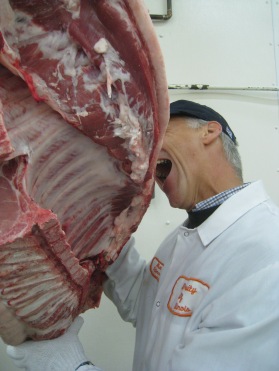Traditions are important, they remind us how our ancestors lived.
However, whilst many traditions may be worth preserving, there are plenty of traditions that are banned to day, for good reasons.
In ancient times, people used to sacrifice prisoners, children or virgins to their gods in exchange for a good life, which essentially meant: a good harvest. Now, we light a candle instead. For ages we have used salt for conservation of food, now we have fridges. For decades we have compromised our health, using DDT and other toxic chemicals for crop protection. Now we have pest-resistant crops. For years, we upheld the ‘tradition’ to keep calves in wooden crates to produce white veal, now we have regulations that forbid such crates.
We are generally happy with alternatives that allow for more durable and friendly ways to produce food, so that we don’t have to feel guilty for what we put into our mouths. It is not acceptable that, in our day and age, we cannot find alternatives for products like Fatty Goose liver or Shark Finn soup. It is impossible that we accept piglets to be castrated, Iberian sows to be ovario-ectomised or layer hens to be debeaked. Because this has nothing to do with tradition, it is simply a shameful degrading of our own humanity. Safe food, produced in a welfare responsible way, is a clear objective that is entirely reachable in our 21st century.
When our younger generation is moving to vegetarianism, it is not because they love vegetables that much, it is because they do not accept how we produce our meat anymore. Young people do understand that food production today has to be different from how it was in the past, but they cannot and should not accept that it can be worse. Not with all the technology and knowledge we have today. Young people are not afraid of technology and innovation but there have been so many food scares in the last decades that nobody knows what’s good and what’s bad anymore. Good journalism and ethical reporting should help, but instead most popular media are only interested in the juicy scary stories that sells papers, never mind the investigating the full truth behind the story.
There are alternatives for debeaking in layers and for tail docking and castration in piglets, these practices can be avoided by improved farm management, by safe vaccines and other technologies. Why is nobody making a story or a documentary about these novel production ways? Because good news does not sell.
We have a moral task to pioneer and to develop alternative and durable ways to produce our food. This does not mean that we need to revert to backyard farming. It does mean that, instead of profit and volume, we need to put health, welfare and sustainability back on the top shelf. The younger generation will thank you if you do, damn you if you don’t.
-
Subscribe
Subscribed
Already have a WordPress.com account? Log in now.